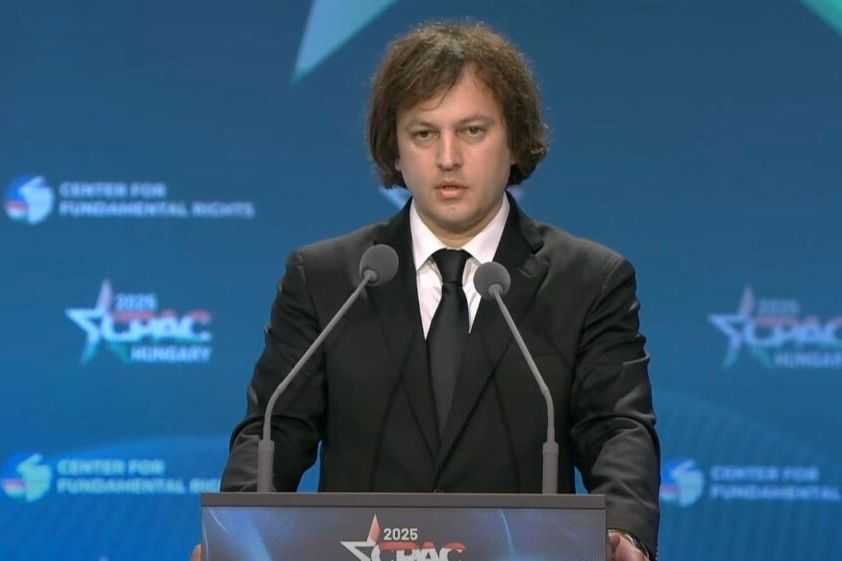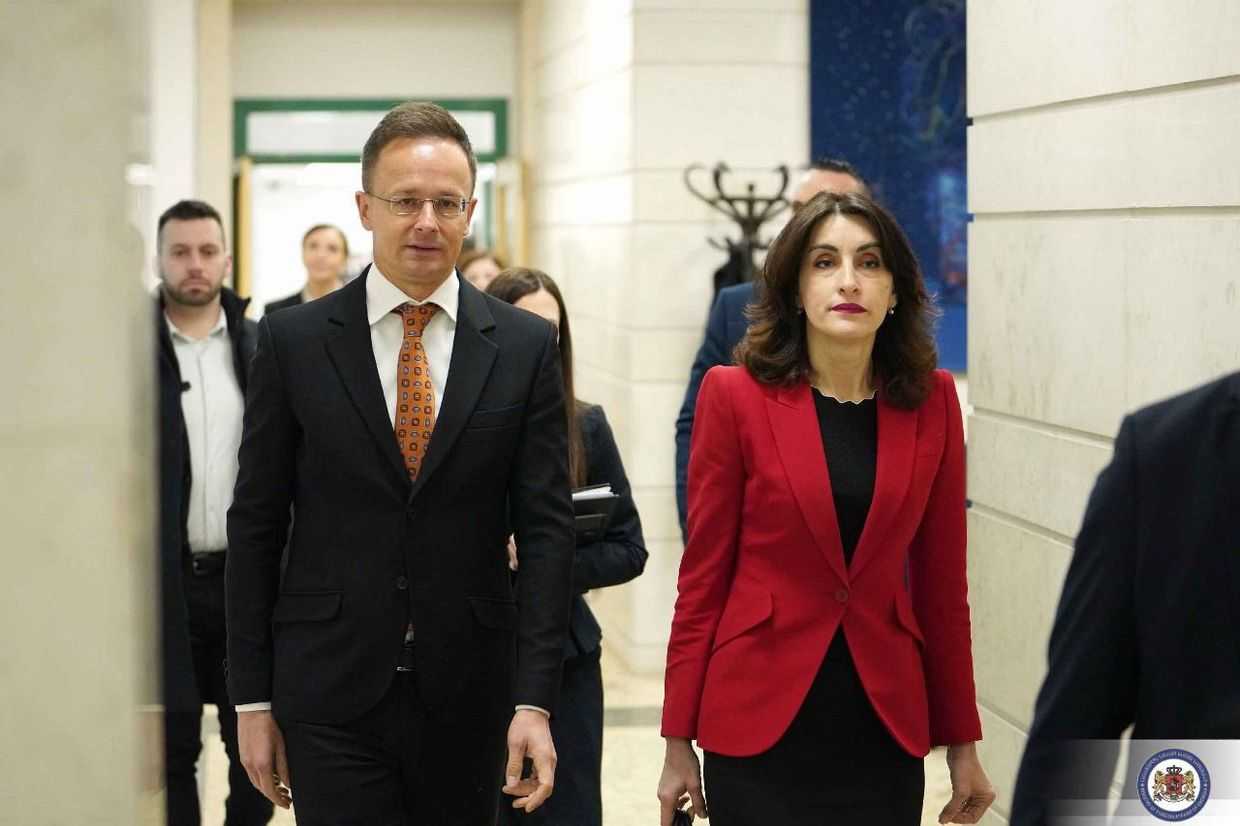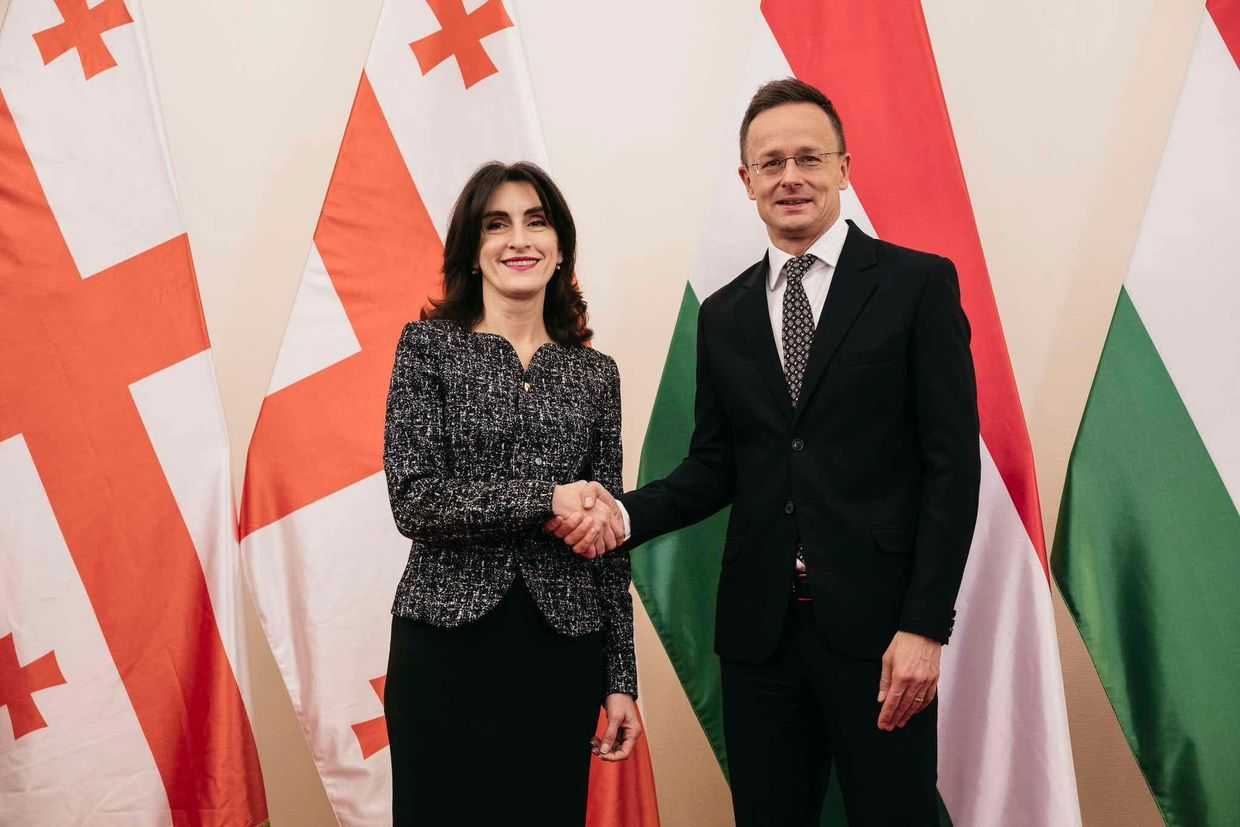Did Hungary help hand Georgian Dream victory in the disputed parliamentary elections?
Hungarian Prime Minister Viktor Orbán and his Fidesz party have meddled in Georgian domestic politics, both publicly and behind closed doors.

Hungarian Prime Minister Viktor Orbán’s arrival in Tbilisi just days after the controversial 2024 parliamentary elections was met with outrage from protesters demonstrating against the widespread allegations of rigging that handed Georgian Dream another four-year-term.
Orbán was the first foreign leader to congratulate Georgian Dream on its electoral victory, tweeting his celebratory message before the results had even been certified.
Almost three months later, as protests against the ruling party’s EU U-turn have continued unabated, Orbán — along with another eurosceptic leader, Slovak Prime Minister Robert Fico — remain the only EU heads of state to formally congratulate, or officially recognise, Georgian Dream’s victory.
While Orbán’s premature congratulations served as a key legitimising message in the early, chaotic post-election days, Hungarian influence — and active efforts — to help Georgian Dream secure another term went much further.
There are roughly four ways in which Hungary meddled in Georgian domestic politics to help Georgian Dream secure another term in power:
- Working with Georgian Dream as advisors and likely helping them coordinate conspiratorial, anti-Western rhetoric
- Connecting Georgian Dream with other illiberal forces, namely the US Republican Party
- Legitimisation of the results by Orbán and other election observers
- The post-election obstruction of punitive measures from the EU
The full spectrum of Hungarian involvement in Georgia clearly amounts to ‘intervention’ in Georgian domestic politics ahead of the election and in the contested aftermath, Daniel Hegedüs, Regional Director for Central Europe at the German Marshall Fund, told OC Media.
He added that Hungary will ‘continue intervening into elections both within and outside of the European Union to support illiberal radical right authoritarian forces’, citing other recent interventions in Slovak and Polish elections.
Pre-election coordination and fostering of connections with rightwing forces
As Georgian Dream’s shift away from the EU intensified after Russia’s full-scale invasion of Ukraine, the party found one consistent ally in the bloc — Orbán and his Fidesz party.
Signs of their budding alliance emerged even earlier.
When then-Prime Minister Irakli Gharibashvili visited Hungary in 2014, the respective foreign ministers signed a document establishing future bilateral collaboration. Hungary continued to support Georgia during the early years of Georgian Dream’s rule, and later that year, the Hungarian low-cost airline Wizz Air began flying to Kutaisi, marking the first European budget airline to add Georgia to its flight itinerary.
In July 2020, amid the height of the COVID-19 pandemic, Hungarian Foreign Minister Péter Szijjártó was the first high-ranking foreign official to visit Georgia. During the visit, Szijjártó met with a number of Georgian officials, as well as Patriarch Illia II.
Then came the signing of a strategic partnership agreement between Orbán and Gharibashvili during the latter’s visit to Budapest in 2022.
Had a great meeting with @GharibashviliGe in Budapest. Discussed ways to enhance our cooperation in the field of energy. Diversification of energy sources is the only way Europe can get out of the #energycrisis. pic.twitter.com/JOoglsjTcs
— Orbán Viktor (@PM_ViktorOrban) October 28, 2022
Already facing pressure from Brussels over creeping authoritarianism and democratic backsliding, Hungary’s isolation from the EU grew as it continued to drag its feet on collective sanctions against Russia following the beginning of the full-scale war against Ukraine.
At the same time, Hungary sought to deepen its ties to the US Republican Party. Trump routinely cited Orbán as one of his favourite European politicians, and the two leaders often echoed similar culture war rhetoric, as well as attacks on the press, NGOs, and liberal figures, such as the regularly vilified Hungarian-American philanthropist George Soros.
When Hungary first hosted its own iteration of the US-based Conservative Political Action Conference (CPAC) in 2022, it was replete with speakers united by conspiratorial thinking and a shared commitment to protect traditional values, but no foreign leaders.
However, the following year, Orbán was joined by Gharibashvili, who addressed the audience in English, giving a speech full of culture war topics very familiar to American ears.
‘What gives us strength to be united?’ Gharibashvili asked the audience rhetorically in his speech in 2023.

‘Notably, the traditional, supreme, eternal, universal values that determine our entire history and culture, as well as our everyday life […] faith, freedom, peace, dignity, truth, equality, purity of the family, respect for parents, ancestors, and traditions, love of the homeland and of people’.
Gharibashvili went on to praise Orbán as ‘truly an exemplary politician, fighter, and striving Christian man’.
During the next year’s CPAC Hungary conference, the newly-appointed Prime Minister Irakli Kobakhidze went a step further, spending the bulk of his speech talking about the protection of traditional values, praising Christianity, bashing immigrants and queer activists, and citing Orbán as an example of an effective defender against ‘liberal propaganda’.
Kobakhidze also referenced Georgia’s own anti-LGBT legislation, which he said would hopefully ‘oppose the so-called liberal ideology and make a significant contribution to the protection of family values and minors’.
Indeed, there are allegations that Georgia has modeled some of the controversial legislation introduced over the last few years, often described as anti-democratic, on similar laws previously introduced by Hungary.
In particular, the controversial foreign agents law, which was first introduced and then scrapped in 2023 amid protests, before being revived in 2024 has often been referred to as the ‘Russian law’ in Georgia — but according to Hegedüs, the law much more closely resembles legislation developed in Hungary.
While Russia’s own foreign agents law is more repressive in practice, Hungary’s law is ‘much more authoritarian than the Russian one […] from a pure legal perspective’, Hegedüs told OC Media.
Orban becomes a tool of legitimisation
In addition to acting as a possible model for some of Georgia’s recent controversial pieces of legislation and coordinating on rhetoric and strategy, Hungary also directly and visibly interfered in the October parliamentary election.
The meddling occurred in plain view, when Orbán sent a congratulatory message to Kobakhidze just 10 minutes after the polls closed and long before the count was officially certified.
Congratulations to Prime Minister @PM_Kobakhidze and the Georgian Dream party on their overwhelming victory at the parliamentary elections today. The people of #Georgia know what is best for their country, and made their voice heard today!
— Orbán Viktor (@PM_ViktorOrban) October 26, 2024
The Hungarian prime minister then traveled to Tbilisi the weekend of the election, which Georgian Dream quickly cited as evidence the party’s victory had been validated by the EU. At the time, Hungary held the rotating president of the EU Council — a coincidence that was repeatedly referenced despite rebuttals from the EU that the visit did not constitute official approval from the bloc.
In an article for the EU Observer published ahead of the elections in May 2024, Hegedüs wrote that due to its holding of the rotating presidency, ‘Hungary will not only be able — and ready — to block EU statements in case of widespread electoral fraud but might also be ready to formally issue statements on behalf of the presidency’.
‘It happened more or less as I predicted’, Hegedüs told OC Media.
Beyond this high-profile sanctioning of the results, András László, a member of Orban’s Fidesz party, also traveled to Georgia to participate as an election observer.
László was one of 23 such ‘politically biased observers who helped whitewash’ the election, ignoring the widespread, heavily documented allegations of fraud.
The growing cohesion of anti-liberal and anti-Western rhetoric from Hungarian and Georgian officials is also likely not just a coincidence.
Arpad Habony, often referred to as one of Orban’s top political spin doctors, has been regularly traveling to Georgia for at least two years, and has often been spotted in the ruling Georgian Dream party’s headquarters.
In addition to Habony, ‘there were Hungarian advisors involved in building the [Georgian Dream’s] communication, internal communication campaigns and over the past two or three years’, Hegedüs told OC Media.
Post-election, Hungary defends Georgian Dream and blocks EU countermeasures
Despite condemnation from across the EU about the widespread allegations of electoral irregularities in Georgia — including a non-binding resolution from the EU Parliament that rejected the results and called for a re-do — Hungary’s defense of Georgian Dream has continued unabated.
Orbán and Szijjártó have reiterated their congratulatory messages to Georgian Dream on its electoral victory, as well as repeating the conspiracy theories that outside forces from the West are trying to interfere in Georgian affairs.
It’s time for the bureaucrats in Brussels and the Soros-network to stop attacking the government in Georgia. I expressed my support to Chairman @shpapuashvili in their fight for Georgia’s sovereignty. pic.twitter.com/GV6wg6icYI
— Orbán Viktor (@PM_ViktorOrban) January 27, 2025
Szijjártó characterised the EU’s criticism of the election as the ‘liberal mainstream’s predictable response’, which he said was ‘hypocritical, tired, and repulsive’. He also said the parliamentary resolution was ‘insulting to an entire nation’.
Hungary, along with Slovakia, also blocked proposed EU sanctions against Georgia in December.
Earlier that month, Szijjártó said they opposed ‘adding Georgian officials to any sanctions list. If such a suggestion arises, Hungary will block it — this is certain’.

Despite repeated statements from the EU regarding the need to take more punitive measures against Georgia as state repression on opposition and protesters increased, the most concrete action taken as of early February has been the suspension of the visa-free regime for holders of Georgian diplomatic passports — a mostly symbolic gesture.
Hungary has also reportedly tried to capitalise on its longstanding ties with Trump and the Republican Party to help massage the deterioration of US–Georgia ties that occurred under President Joe Biden.
In January, the Georgian media outlet TV Pirveli claimed, citing sources, that Orbán’s chief of staff Antal Rogan had tried to broker a meeting between Trump and Bidzina Ivanishvili, the founder and honorary chair of Georgian Dream.
However, the plans reportedly collapsed after the US announced it was sanctioning Rogan under the Global Magnitsky Act in the final days of the Biden administration. It is unclear if the sanctions will remain in place now that Trump is president given his close personal ties to Orbán.
Nonetheless, Georgian Dream is pursuing its own lobbying of the Trump administration, opting to lean into the culture war issues as a means of obfuscating its ties to China and other foes of the US — a move straight out of the Hungary playbook, Hegedüs told OC Media.
A marriage of convenience?
Despite being a perpetual thorn in the side of the EU, especially when it comes to collective action against Russia, there are limits to how much Hungary can achieve with its grandstanding.
Unanimity is required for EU-wide sanctions on Russia, and despite consistent resistance from Hungary, it has nonetheless, perhaps begrudgingly, approved of 15 rounds of sanctions since February 2022.
In more recent days, Orbán has also demonstrated that he is wary of publicly crossing Trump. Earlier in January, he backtracked from a threat to oppose the next round of EU sanctions against Russia after Trump threatened new tariffs and other punitive measures if Russian President Vladimir Putin did not ‘STOP this ridiculous war’.
For the average Hungarian voter, Orbán’s support for Georgian Dream is likely a non-issue. To a certain extent, many supporters of Fidesz have appreciated that Hungary is punching above its weight on the diplomatic stage, even if that importance stems from its position as a disrupter rather than a positive force.
But at the same time, Hungarian opposition leader Peter Magyar has argued that Orbán’s constant obstinance toward Brussels has resulted in the freezing of EU funds, and therefore, less money for the average Hungarian.
Orbán is likely facing his strongest challenger in the last 15 years with Magyar, and the narrative that Orbán is ‘blocking potential EU responses to Georgia, instead of focusing on the reforms which would allow getting access to the suspended EU money [...] could sit now in the Hungarian public narrative’, Hegedüs says.
Indeed, public outrage against Fico, the other primary obstacle in the EU against collective action against Russia (as well as Georgia), has boiled over in recent weeks, with protesters arguing that Fico’s antagonism of Brussels is hurting the country.
Another possible approach to separating the Hungary–Georgia alliance would be to highlight Georgian Dream’s ties to China, as well as Beijing’s growing influence in the South Caucasus.
Representative Joe Wilson, likely the most outspoken opponent of Georgian Dream in the US Congress and a close ally of Trump, has hinted at this in recent appeals to the new president.
Slovakia and Hungary are wrongly and misguidedly blocking EU sanctions on the illegitimate Ivanishvili regime, which is selling out Georgia to the CCP, the Iranian regime, and War Criminal Putin. This is against US national security interests. Trump will fix it.
— Joe Wilson (@RepJoeWilson) January 30, 2025
From the perspective of Georgian Dream, an alliance with Hungary is purely opportunistic, as a small country like Georgia will take whatever friends it can get.
The loss of its ally, should Orbán change heart or lose power, would likely not be a critical blow to Georgian Dream, but would mean the loss of its primary remaining friend in the EU.











